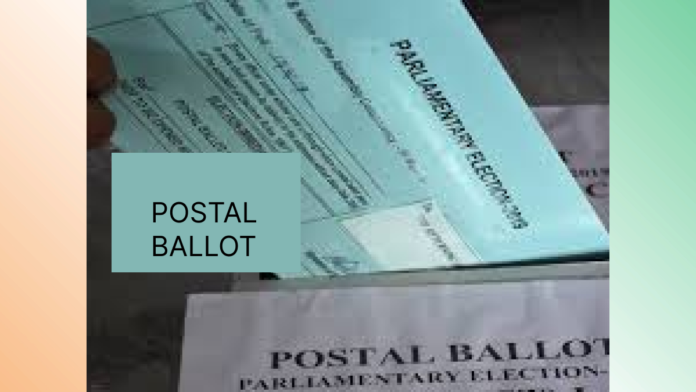In India, it is the duty of the Election Commission of India (ECI) to conduct elections properly. Initially, elections were conducted by using ballot papers, which was a very difficult task. The introduction of electronic voting machines (EVMs) has made the election process much easier. Even the counting is also easy and the suspense of the results also comes to an end. Results are declared within 24 hours on counting day.
The Election Commission of India (ECI) has recently announced that journalists covering “polling day activities” are now eligible to vote in the upcoming Lok Sabha elections in 2024 and state Assembly polls via postal ballots. This initiative allows eligible voters to exercise their right to vote even when they are unable to cast their votes in person. The use of postal ballots has made the electoral process more inclusive and accessible. If you are not familiar with the process of voting through postal ballots, keep reading to learn everything you need to know about it.
In India, eligible voters who are unable to cast their vote in person have the option of postal voting. The Election Commission of India’s Electronically Transmitted Postal Ballot Papers (ETPB) system facilitates this process. The voters receive the ballot papers via post, and they can return their votes through post as well. During the vote counting, the postal votes are counted first, followed by the votes cast through electronic voting machines.
Let’s have a look at the eligibility criteria for postal voting.
There are specific criteria that must be met to be eligible for postal voting. This includes individuals who work in the union armed forces and state police, their spouses, and employees of the Government of India who are posted overseas. Additionally, individuals who are in preventive detention, disabled, or aged 65 and above are allowed to use postal voting. However, prisoners are not permitted to vote by post.Media professionals are also permitted to use postal voting to cast their votes.
However, the Communist Party of India (Marxist) has raised concerns about potential manipulation and malpractice with postal ballots, which could impact the verifiability of a large number of voters, thereby compromising the transparency and integrity of the voting process.
Postal ballots, also known as mail-in ballots, allow registered voters to cast their votes by mail instead of going to a physical polling station.
Who is eligible to vote via postal ballots?
There are several categories of eligible electors who can choose to vote via postal ballots. These include the following:
Voters Serving the Nation: Members of the armed forces, paramilitary forces, and government employees who are deployed on election duty far from their home constituencies.
Voters who are Absent: Individuals who are unable to vote in person due to reasons such as work commitments, illness, or disability.
Electors on election duty: Government officials and polling staff who are assigned duties at polling stations other than their own.
Electors under preventive detention: Individuals who are detained under preventive custody orders during the election period.
Voters (Essential services) covering polling day activities: Media persons with authorization letters from the Election Commission and those involved in essential services such as metros, railways, and healthcare have the option to vote using postal ballots in Lok Sabha and four state Assembly polls.
Specially Abled People (PwDs): The Ministry of Law and Justice amended the Conduct of Election Rules, 1961 in October 2019, allowing PwDs to cast votes via postal ballots in the 2020 Delhi Assembly polls. The age limit for postal voting was also lowered from 85 to 80.
How to apply for postal ballot?
To apply for a postal ballot, eligible voters need to fill out Form 12 D and submit it to the returning officer (RO) of their respective constituency. The form requires personal details, voter identification information, and the reason for seeking a postal ballot. The RO will verify eligibility and issue the postal ballot if the criteria are met.
For service voters, the RO will send the postal ballot paper through the record office, either directly or through the Ministry of External Affairs if they are serving outside India.
For senior citizens, a team of two polling officials, a videographer, and security personnel will visit their residences to facilitate the process. Voters will receive an SMS informing them of the date and time of the officials’ visit.
Once approved, the Returning Officer (RO) will send the postal ballot to the voter’s registered address, including the ballot paper, declaration form, secrecy sleeve, and pre-paid return envelope. Voters must mark their preferred candidate(s) on the ballot paper in the secrecy sleeve to ensure confidentiality. They must also fill out the declaration form, providing their signature and other relevant details. Voters must then seal the marked ballot paper and declaration form inside the secrecy sleeve and place it into the pre-paid return envelope. Finally, voters must affix the postage stamp and mail the return envelope to the designated address within the specified time.
Postal ballots are counted separately from votes cast at polling stations. On the designated counting day, postal ballots are collected by postal authorities and brought to the counting center. The RO and election officials scrutinize postal ballots for validity and integrity, adding valid ballots to the respective candidate’s vote count.
Postal voting, facilitated by the ECI’s Electronically Transmitted Postal Ballot Papers (ETPB) system, provides a convenient option for eligible voters who cannot cast their votes in person. With specific eligibility criteria in place, including provisions for service voters, absentee voters, electors on election duty, individuals under preventive detention, essential services personnel, and persons with disabilities (PwDs), postal voting ensures that a diverse range of citizens can participate in the democratic process. By simplifying the application process through Form 12 D and ensuring confidentiality through the secrecy sleeve, postal voting upholds the integrity and transparency of elections in India.
Please Vote for a progressive India. Celebrate the festival of democracy.
